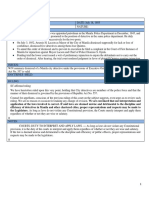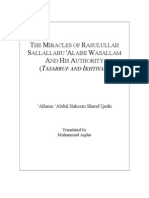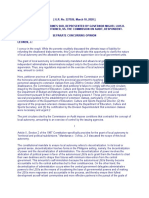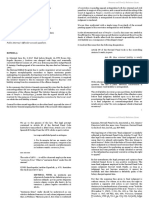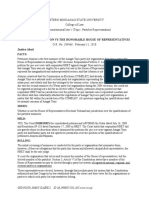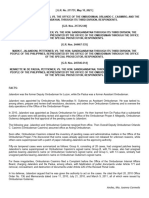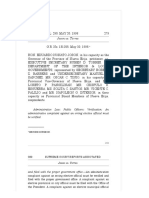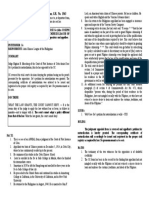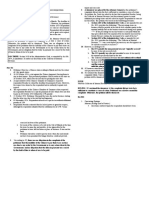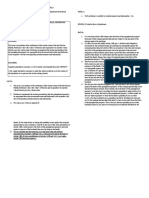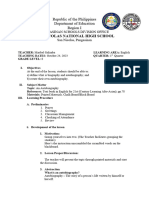0 ratings0% found this document useful (0 votes)
81 views406 MARZO Melchor Vs Moya
406 MARZO Melchor Vs Moya
Uploaded by
Carissa CruzThis case involved a petition challenging the constitutionality of the Rent Control Law (Republic Act No. 6359). The Supreme Court reversed the lower court's decision declaring the law unconstitutional. The Supreme Court upheld the validity of the Rent Control Law, finding that Presidential Decree No. 20 validly amended the law and that rent control is a valid exercise of police power to address the economic distress of many citizens regarding housing costs. The Court also noted the presumption that laws enacted by Congress are constitutional.
Copyright:
© All Rights Reserved
Available Formats
Download as DOCX, PDF, TXT or read online from Scribd
406 MARZO Melchor Vs Moya
406 MARZO Melchor Vs Moya
Uploaded by
Carissa Cruz0 ratings0% found this document useful (0 votes)
81 views2 pagesThis case involved a petition challenging the constitutionality of the Rent Control Law (Republic Act No. 6359). The Supreme Court reversed the lower court's decision declaring the law unconstitutional. The Supreme Court upheld the validity of the Rent Control Law, finding that Presidential Decree No. 20 validly amended the law and that rent control is a valid exercise of police power to address the economic distress of many citizens regarding housing costs. The Court also noted the presumption that laws enacted by Congress are constitutional.
Original Title
406 MARZO Melchor vs Moya
Copyright
© © All Rights Reserved
Available Formats
DOCX, PDF, TXT or read online from Scribd
Share this document
Did you find this document useful?
Is this content inappropriate?
This case involved a petition challenging the constitutionality of the Rent Control Law (Republic Act No. 6359). The Supreme Court reversed the lower court's decision declaring the law unconstitutional. The Supreme Court upheld the validity of the Rent Control Law, finding that Presidential Decree No. 20 validly amended the law and that rent control is a valid exercise of police power to address the economic distress of many citizens regarding housing costs. The Court also noted the presumption that laws enacted by Congress are constitutional.
Copyright:
© All Rights Reserved
Available Formats
Download as DOCX, PDF, TXT or read online from Scribd
Download as docx, pdf, or txt
0 ratings0% found this document useful (0 votes)
81 views2 pages406 MARZO Melchor Vs Moya
406 MARZO Melchor Vs Moya
Uploaded by
Carissa CruzThis case involved a petition challenging the constitutionality of the Rent Control Law (Republic Act No. 6359). The Supreme Court reversed the lower court's decision declaring the law unconstitutional. The Supreme Court upheld the validity of the Rent Control Law, finding that Presidential Decree No. 20 validly amended the law and that rent control is a valid exercise of police power to address the economic distress of many citizens regarding housing costs. The Court also noted the presumption that laws enacted by Congress are constitutional.
Copyright:
© All Rights Reserved
Available Formats
Download as DOCX, PDF, TXT or read online from Scribd
Download as docx, pdf, or txt
You are on page 1of 2
MELCHOR vs.
MOYA (MARZO) This is a petition for certiorari instituted by then
March 17, 1983 | Fernando, J. | adherence to, or departure Executive Secretary Alejandro Melchor Jr seeking
from, language of statute - literal interpretation - departure
to reverse the decision of the respondent Judge
from literal interpretation
Jose Moya who declared Republic Act No. 6359
PETITIONER: ALEJANDRO MELCHOR, JR., in his capacity
(Rent Control Law) as amended by Presidential
as Executive Secretary Decree No. 20 unconstitutional on the ground that
RESPONDENTS: HON. JOSE L. MOYA, as Judge of the it is not a valid police power measure.
Court of First Instance of Manila, REALTY OWNERS
ISSUE: Is Republic Act No. 6359 or the Rent Control
ASSOCIATION OF THE PHILIPPINES, INC., and ALBERTO
Law unconstitutional?
GUEVARA, SR.
RULING: No, it is not. Republic Act 6359 is valid.
DOCTRINE:
RATIO:
1. Pursuant to the provisions of the 1973
Constitution, Presidential Decrees promulgated The Supreme Court reversed the assailed decision
or issued, or acts from by President Marcos and upheld the constitutionality of Republic Act
6359 primarily on the following grounds:
shall be part of the law of the land and to
o The issuance of Presidential Decree No. 20
remain valid, legal, binding, and effective
more than justified the validity of RA 6359.
except when modified, revoked, or suspended
Pursuant to the provisions of the 1973
by him as incumbent president or unless
Constitution, Presidential Decrees
expressly and explicitly modified or repealed by
promulgated or issued, or acts from by
the Batasang Pambansa. President Marcos shall be part of the law of
2. “it would be illogical in the extreme if an the land and to remain valid, legal, binding,
amendatory act is given full force and effect and
and effective except when modified,
yet the statute it sought to amend would be
revoked, or suspended by him as incumbent
declared as being tainted by an unconstitutional
president or unless expressly and explicitly
infirmity.”
modified or repealed by the Batasang
Pambansa.
o In the case of Aquino Jr. vs. COMELEC, the
FACTS: Supreme Court has already upheld the
power of the President to issue decrees and
(This case was written in an unconventional that these have the force and effect of law.
manner) o In the case of Gutierrez vs. Cantada, the
Court also left no doubt as to the binding
effect of the Rent Control Law that it stems forgotten that shelter is one of the basic
from a police power legislation with the social and economic rights.”
objective to remedy the plight of lessees, o It would appear as well that the declaration
and was later amended by PD No. 20, of unconstitutionality by the respondent
another valid law. judge was based on doubts entertained by
o Thus, the Supreme Court stated that “it him about the validity of the Act, however,
would be illogical in the extreme if an the Supreme Court reiterated the time
amendatory act is given full force and effect settled rule that laws enacted by Congress
and yet the statute it sought to amend are presumed to be valid.
would be declared as being tainted by an
WHEREFORE, the appealed decision declaring
unconstitutional infirmity.”
unconstitutional Republic Act No. 6359 is reversed.
The Supreme Court also discussed the roots of
Costs against respondents Realty Owners Association of
the assailed decision as follows:
the Philippines and Alberto Guevara, Sr.
o The respondent retired judge held the Act
unconstitutional for being violative of the
equal protection clause as being class
legislation however, the Supreme Court
stated that this statute was enacted as a
valid exercise of the State’s police power. It
was enacted to promote the public interest
and the general welfare and that the State
is not compelled to stand idle where a
considerable segment of its citizens suffers
from economic distress.
o The respondent retired judge also declared
the Act unconstitutional for violating due
process as it is oppressive, however, the
Supreme Court quickly disregarded such
argument stating that “how can a measure
specifically designed to ease a housing
shortage, resulting in unwarranted increase
in rentals to the grave prejudice of the
lower-income groups, be considered
arbitrary or oppressive? It is not to be
You might also like
- 3in1 Celeb, Dating and HookupDocument15 pages3in1 Celeb, Dating and Hookupga.wiz987100% (8)
- Quintos v. LacsonDocument1 pageQuintos v. LacsonZepht BadillaNo ratings yet
- 400 City of Baguio v. MarcosDocument2 pages400 City of Baguio v. MarcosCarissa CruzNo ratings yet
- Chapter 2 - Basic Documents and TransactionsDocument33 pagesChapter 2 - Basic Documents and Transactionsmarissa casareno almuete100% (1)
- Tassoul J.-L. Stellar Rotation (CUP, 2000) (ISBN 0521772184) (273s) - PADocument273 pagesTassoul J.-L. Stellar Rotation (CUP, 2000) (ISBN 0521772184) (273s) - PAnanmate8664100% (1)
- THE MIRACLES OF RASULULLAH صلى الله عليه و آله و صحبه و سلم AND HIS AUTHORITY (TASARRUF AND IKHTIYAR)Document10 pagesTHE MIRACLES OF RASULULLAH صلى الله عليه و آله و صحبه و سلم AND HIS AUTHORITY (TASARRUF AND IKHTIYAR)faisal.noori5932No ratings yet
- Anaya Vs ParaloanDocument3 pagesAnaya Vs Paraloanms_paupauNo ratings yet
- Cases For PrelimDocument49 pagesCases For PrelimDILG XIII- Atty. Robelen CallantaNo ratings yet
- Gsis V CoaDocument7 pagesGsis V CoajerushabrainerdNo ratings yet
- Persons Cases (25-42, Except 33)Document97 pagesPersons Cases (25-42, Except 33)Cece AustriaNo ratings yet
- Llamas V Orbos DigestDocument1 pageLlamas V Orbos DigestnikkoladNo ratings yet
- Legal Research Ting Vs Velez Ting GR No 166562 CASE DIGEST November 9, 2019Document13 pagesLegal Research Ting Vs Velez Ting GR No 166562 CASE DIGEST November 9, 2019Brenda de la GenteNo ratings yet
- Animas vs. PVAODocument19 pagesAnimas vs. PVAOConradoJimenezNo ratings yet
- In Re LauretaDocument2 pagesIn Re LauretaTasneem C BalindongNo ratings yet
- Case Digest 01.14.2019Document15 pagesCase Digest 01.14.2019EmNo ratings yet
- Eugenio Vs DrilonDocument2 pagesEugenio Vs Drilonkei takiNo ratings yet
- Codilla V de Venecia, G.R. 150605 (2002) DigestDocument2 pagesCodilla V de Venecia, G.R. 150605 (2002) DigestJP DCNo ratings yet
- Republic of The Philippines (Represented by The Land Tenure Administration), vs. Antonio Prieto G.R. No. L-17946Document5 pagesRepublic of The Philippines (Represented by The Land Tenure Administration), vs. Antonio Prieto G.R. No. L-17946Gwyneth SantosNo ratings yet
- Rallos JR V GakoDocument3 pagesRallos JR V GakoRich ReyesNo ratings yet
- Akbayan Youth V COMELECDocument2 pagesAkbayan Youth V COMELECCarissa CruzNo ratings yet
- Mane v. Judge BelenDocument2 pagesMane v. Judge BelenApril DigasNo ratings yet
- Article II. Auto Limitation - Tanada vs. Angara (Case Digest)Document1 pageArticle II. Auto Limitation - Tanada vs. Angara (Case Digest)Ellie HarmonieNo ratings yet
- TRADERS ROYAL BANK vs. INTERMEDIATE APPELLATE COURTDocument2 pagesTRADERS ROYAL BANK vs. INTERMEDIATE APPELLATE COURTHanneza Mae DualloNo ratings yet
- 6 Aquino Jr. V ComelecDocument4 pages6 Aquino Jr. V ComelecBGodNo ratings yet
- Pobre v. MendietaDocument2 pagesPobre v. MendietaEmrico Cabahug0% (1)
- Villasenior Vs SandiganbayanDocument1 pageVillasenior Vs SandiganbayanEstee XoohNo ratings yet
- Defensor-Santiago V COMELECDocument1 pageDefensor-Santiago V COMELECKyraNo ratings yet
- Imbong V Hon. Ochoa, Jr. GR NO. 204819 APRIL 8, 2014 FactsDocument8 pagesImbong V Hon. Ochoa, Jr. GR NO. 204819 APRIL 8, 2014 FactsJack NumosNo ratings yet
- 9 Rutter V EstebanDocument2 pages9 Rutter V EstebanCedrickNo ratings yet
- Case Digest On Carlos v. Angeles G.R. No. 142907 (Nov. 29, 2000)Document1 pageCase Digest On Carlos v. Angeles G.R. No. 142907 (Nov. 29, 2000)Revz LamosteNo ratings yet
- Susan Go and The People of The PhilippinesDocument11 pagesSusan Go and The People of The PhilippinesSam ting wongNo ratings yet
- Regal Films vs. Concepcion G.R. 139532Document4 pagesRegal Films vs. Concepcion G.R. 139532jackNo ratings yet
- January 11, 2018 - G.R. No. 196890 - Case DigestDocument2 pagesJanuary 11, 2018 - G.R. No. 196890 - Case DigestJed AlfonsoNo ratings yet
- Ang v. GupanaDocument3 pagesAng v. Gupanachappy_leigh118No ratings yet
- Albayon VS COMELEC Case DigestDocument2 pagesAlbayon VS COMELEC Case DigestCL GeduquioNo ratings yet
- G.R. No. 103119 October 21, 1992 SULPICIO INTOD, Petitioner, Honorable Court of Appeals and People of The PHILIPPINES, RespondentsDocument99 pagesG.R. No. 103119 October 21, 1992 SULPICIO INTOD, Petitioner, Honorable Court of Appeals and People of The PHILIPPINES, RespondentsSai RosalesNo ratings yet
- G.R. No. 177983Document5 pagesG.R. No. 177983Joses Nino AguilarNo ratings yet
- Guingona V CaragueDocument4 pagesGuingona V CaragueAngela Marie AlmalbisNo ratings yet
- A.C. No. 6933-Benito, Li Carl T. (VAWC)Document2 pagesA.C. No. 6933-Benito, Li Carl T. (VAWC)licarl benitoNo ratings yet
- Ui vs. BonifacioDocument1 pageUi vs. BonifacioDean BenNo ratings yet
- Villaflor Vs Sarita DigestDocument3 pagesVillaflor Vs Sarita DigestMustapha AmpatuanNo ratings yet
- 21-Cruz Vs IturraldeDocument6 pages21-Cruz Vs IturraldeLexter CruzNo ratings yet
- Pandi V CA DigestDocument2 pagesPandi V CA DigestrubsyadowNo ratings yet
- ArlinObiasca v. JeaneBasallote, G.R. No. 176707, February 17, 2010Document23 pagesArlinObiasca v. JeaneBasallote, G.R. No. 176707, February 17, 2010Estel Tabumfama0% (1)
- IN RE JUDGE RODOLFO MANZANO A.M. No. 88-7-1861-RTCDocument2 pagesIN RE JUDGE RODOLFO MANZANO A.M. No. 88-7-1861-RTCtimkangjelian2021No ratings yet
- Chiok V People and ChuaDocument3 pagesChiok V People and Chuaayesha jaafarNo ratings yet
- GR NO. 211751 - Andes, CarmelaDocument4 pagesGR NO. 211751 - Andes, CarmelaCarmela Luchavez AndesNo ratings yet
- People Vs AbanillaDocument1 pagePeople Vs AbanillaTaJheng BardeNo ratings yet
- Disomang Cop vs. Datumanong November 25, 2004 - TingaDocument5 pagesDisomang Cop vs. Datumanong November 25, 2004 - TingaLeslie OctavianoNo ratings yet
- 62 Court Administrator v. QuinanolaDocument1 page62 Court Administrator v. QuinanolaNMNGNo ratings yet
- Guamaua vs. EspinoDocument3 pagesGuamaua vs. EspinoCin100% (1)
- 14.2 Bornasal V MontesDocument1 page14.2 Bornasal V MontesTricksterNo ratings yet
- People Vs AntonioDocument2 pagesPeople Vs AntonioPrincessClarizeNo ratings yet
- Lopez & Sons, Inc. vs. Court of Tax AppealsDocument1 pageLopez & Sons, Inc. vs. Court of Tax AppealsayasueNo ratings yet
- Atty. Melvin D.C. Mane V. Judge Medel Arnaldo B. Belen A.M. No. RTJ-08-2119, 30 June 2008Document1 pageAtty. Melvin D.C. Mane V. Judge Medel Arnaldo B. Belen A.M. No. RTJ-08-2119, 30 June 2008Michael Renz PalabayNo ratings yet
- People Vs Egot Crim LawDocument6 pagesPeople Vs Egot Crim LawRiver Mia RomeroNo ratings yet
- Romualdez Vs SandiganbayanDocument1 pageRomualdez Vs SandiganbayanCarlo Vincent BalicasNo ratings yet
- City of Baguio Vs Marcos, 27 SCRA 342, G.R. No. L-26100, February 28, 1969Document1 pageCity of Baguio Vs Marcos, 27 SCRA 342, G.R. No. L-26100, February 28, 1969Gi NoNo ratings yet
- 10 Torres Vs YuDocument13 pages10 Torres Vs YuJamie VodNo ratings yet
- Grace Poe Disqualification Case (Essay)Document2 pagesGrace Poe Disqualification Case (Essay)John Bryan AldovinoNo ratings yet
- Joson v. TorresDocument38 pagesJoson v. TorresFidel Rico NiniNo ratings yet
- Midterm Cases EvidenceDocument309 pagesMidterm Cases EvidenceAiai Harder - GustiloNo ratings yet
- Fulgencio V National Labor Relations Commission DigestDocument2 pagesFulgencio V National Labor Relations Commission DigestTollie GarciaNo ratings yet
- Trial Memorandum BuenoDocument3 pagesTrial Memorandum BuenoEfie LumanlanNo ratings yet
- Consti 2 ArquilloDocument10 pagesConsti 2 ArquilloGertrude ArquilloNo ratings yet
- 419 CRUZ Felipe V LeuterioDocument1 page419 CRUZ Felipe V LeuterioCarissa CruzNo ratings yet
- 324 BONBON Go v. Anti-Chinese League of The Philippines, G.R. No. 1563, August 30, 1949.Document1 page324 BONBON Go v. Anti-Chinese League of The Philippines, G.R. No. 1563, August 30, 1949.Carissa CruzNo ratings yet
- 377 People v. GarciaDocument2 pages377 People v. GarciaCarissa CruzNo ratings yet
- 304 CRUZ Bustamante v. NLRCDocument2 pages304 CRUZ Bustamante v. NLRCCarissa CruzNo ratings yet
- 381 LANDERIO Casco Philippine Chemical Co., Inc. v. GimenezDocument1 page381 LANDERIO Casco Philippine Chemical Co., Inc. v. GimenezCarissa CruzNo ratings yet
- 373 CRUZ Comendador v. VillaDocument2 pages373 CRUZ Comendador v. VillaCarissa CruzNo ratings yet
- 427 LANDERIO Solid Homes Inc., V PayawalDocument1 page427 LANDERIO Solid Homes Inc., V PayawalCarissa CruzNo ratings yet
- 334 GONZALES Regalado vs. YuloDocument2 pages334 GONZALES Regalado vs. YuloCarissa CruzNo ratings yet
- 321 VILLAMIEL Pascual v. Pascual-BautistaDocument2 pages321 VILLAMIEL Pascual v. Pascual-BautistaCarissa CruzNo ratings yet
- 429 MARZO People vs. LakandulaDocument3 pages429 MARZO People vs. LakandulaCarissa CruzNo ratings yet
- 442 CRUZ Manila Lodge v. CADocument1 page442 CRUZ Manila Lodge v. CACarissa CruzNo ratings yet
- 361 Masangya Muñoz. v. HordDocument1 page361 Masangya Muñoz. v. HordCarissa CruzNo ratings yet
- 359 MA Rivera vs. CampbellDocument1 page359 MA Rivera vs. CampbellCarissa CruzNo ratings yet
- 390 VILLAMIEL Spouses Belo v. Philippine National BankDocument2 pages390 VILLAMIEL Spouses Belo v. Philippine National BankCarissa CruzNo ratings yet
- 312 Landerio Tanad v. YuloDocument2 pages312 Landerio Tanad v. YuloCarissa CruzNo ratings yet
- 385 PACAMPARRA Chartered Bank of India, Australia and China v. ImperialDocument2 pages385 PACAMPARRA Chartered Bank of India, Australia and China v. ImperialCarissa CruzNo ratings yet
- 408 Pacamparra Chui v. PosadasDocument2 pages408 Pacamparra Chui v. PosadasCarissa CruzNo ratings yet
- 431 PACAMPARRA University of Santo Tomas v. The Board of Tax AppealsDocument2 pages431 PACAMPARRA University of Santo Tomas v. The Board of Tax AppealsCarissa CruzNo ratings yet
- 335 Landerio Demafiles v. ComelecDocument2 pages335 Landerio Demafiles v. ComelecCarissa Cruz100% (1)
- 355 FREGILLANA de Jesus v. City of ManilaDocument2 pages355 FREGILLANA de Jesus v. City of ManilaCarissa CruzNo ratings yet
- 327 CRUZ Velasco v. LopezDocument2 pages327 CRUZ Velasco v. LopezCarissa CruzNo ratings yet
- 338 MASANGYA Casela v. Court of AppealsDocument2 pages338 MASANGYA Casela v. Court of AppealsCarissa CruzNo ratings yet
- 407 Masangya Reyes v. RepublicDocument1 page407 Masangya Reyes v. RepublicCarissa CruzNo ratings yet
- 384 Masangya Pritchard v. RepublicDocument2 pages384 Masangya Pritchard v. RepublicCarissa CruzNo ratings yet
- 342 TAN Matabuena v. CervantesDocument1 page342 TAN Matabuena v. CervantesCarissa CruzNo ratings yet
- 310 GARIN Rizal Commercial Banking v. Intermediate Appellate Court and BF HomesDocument1 page310 GARIN Rizal Commercial Banking v. Intermediate Appellate Court and BF HomesCarissa CruzNo ratings yet
- 396 CRUZ Vda de Padilla v. Vda de PadillaDocument2 pages396 CRUZ Vda de Padilla v. Vda de PadillaCarissa CruzNo ratings yet
- Questions With Where and Possessive S and SDocument15 pagesQuestions With Where and Possessive S and SJoriel GonzálezNo ratings yet
- Draco Malfoy and TheDocument155 pagesDraco Malfoy and Theeliza.h2131No ratings yet
- DOMINICA I Post EpiphaniamDocument29 pagesDOMINICA I Post EpiphaniamJustinNo ratings yet
- Soal Soal Descriptive Text (Teks Rumpang)Document2 pagesSoal Soal Descriptive Text (Teks Rumpang)khoirotun nisatasni0% (1)
- Interaction Ritual and Not Just Artful Performance in Crossing and StylizationDocument29 pagesInteraction Ritual and Not Just Artful Performance in Crossing and StylizationJustinSantostefanoNo ratings yet
- The Aesthetics of Interactive Music Systems: Robert RoweDocument5 pagesThe Aesthetics of Interactive Music Systems: Robert Rowesertimone0% (1)
- Industrial 5.0 Aquaponics System Using Machine Learning TechniquesDocument8 pagesIndustrial 5.0 Aquaponics System Using Machine Learning TechniquesArshiya AliNo ratings yet
- CBSE Sample Paper Class 7 Science Set 5Document4 pagesCBSE Sample Paper Class 7 Science Set 5Sumanta PanNo ratings yet
- How To Approach A PoemDocument2 pagesHow To Approach A PoemChris HKNo ratings yet
- San Miguel Corporation vs. KahnDocument22 pagesSan Miguel Corporation vs. KahnmyownperfectbubbleNo ratings yet
- Software Engineering An International Journal (SEIJ) : ScopeDocument2 pagesSoftware Engineering An International Journal (SEIJ) : ScopeCS & ITNo ratings yet
- Offer Letter-Ravi Iyar PDFDocument13 pagesOffer Letter-Ravi Iyar PDFabra dabraNo ratings yet
- Principles of Option PricingDocument30 pagesPrinciples of Option PricingVaidyanathan Ravichandran100% (1)
- U1 - Migrations, Diversity and Non-DiscriminationvaluesDocument60 pagesU1 - Migrations, Diversity and Non-DiscriminationvaluesИлонаЛукьянюкNo ratings yet
- Ielts Mock Test 2021 June Writing Practice Test 1 394632Document8 pagesIelts Mock Test 2021 June Writing Practice Test 1 394632sreya hossainNo ratings yet
- Layleen Polanco NYC Board of Correction ReportDocument17 pagesLayleen Polanco NYC Board of Correction ReportNational Content DeskNo ratings yet
- Research Paper On William ShakespeareDocument8 pagesResearch Paper On William Shakespearexactrjwgf100% (1)
- DENGA-EY, Melrhean Grace M. - Activity1Document1 pageDENGA-EY, Melrhean Grace M. - Activity1Melrhean Grace Denga-eyNo ratings yet
- 7th Grade First Exam Second Semester 2016Document2 pages7th Grade First Exam Second Semester 2016Mohammad Al-MinwerNo ratings yet
- PleurodesisDocument30 pagesPleurodesisPurnama Aji Saputra100% (2)
- LP AutobiographyDocument3 pagesLP AutobiographyMaribel GalimbaNo ratings yet
- Lecture Topic 2.1.6Document10 pagesLecture Topic 2.1.6AvishiNo ratings yet
- Critical Evaluation of B.ed (Hons) Curriculum PDFDocument11 pagesCritical Evaluation of B.ed (Hons) Curriculum PDFHaidahmad RazaNo ratings yet
- Where There Is A Will There Is A WayDocument3 pagesWhere There Is A Will There Is A WayGeofrey PeterNo ratings yet
- Red Hat Ansible Automation With Exam Exam PrepDocument1 pageRed Hat Ansible Automation With Exam Exam PrepDivyam PateriyaNo ratings yet
- RTC1048 1901 1relay UP To 16 Program SMPSDocument4 pagesRTC1048 1901 1relay UP To 16 Program SMPSKishore KNo ratings yet

